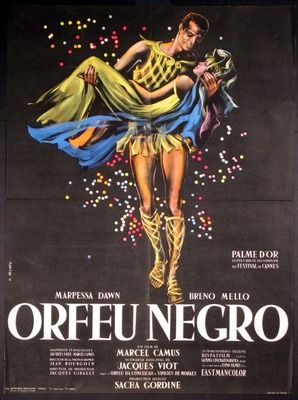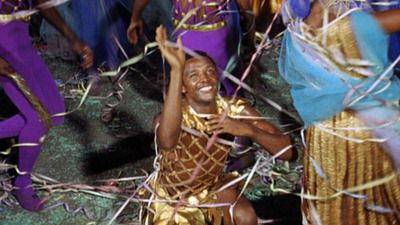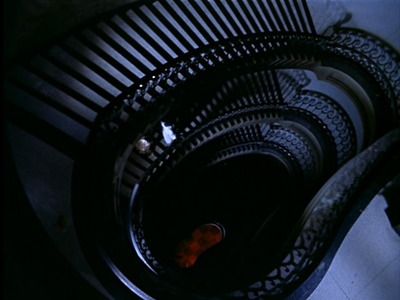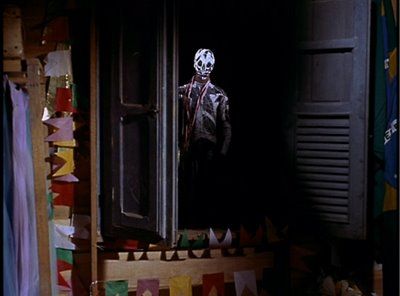
Black Orpheus
1959
Director: Marcel Camus
Starring: Breno Mello, Marpessa Dawn, Lourdes de Oliveira, Lea Garcia
The old stories, the classic stories, simply will not die. They are told time and time again, in different cultures, in different languages. I am always fascinated by how a story of one culture can be reinterpreted and retold, usually with great success, by a completely different culture. Black Orpheus is a great example of this, how a classic story of Greek mythology is reinterpreted in 1950s Rio de Janeiro during Carnaval.
As stated, the film is a retelling of the Orpheus myth. In this case, Orfeu (Mello) is a streetcar operator in Rio, and he meets Eurydice (Dawn) when she rides the trolley car to the end of the line her first day in town. She is there to visit her cousin Serafina (Garcia), but Orfeu is more concerned with marrying his shrill harpy of a fiancée Mira (de Oliveira). Eurydice confesses to Mira that she fears Death is stalking her. Eurydice and Orfeu fall in love over Orfeu’s music, and Orfeu spends most of Carnaval avoiding a jealous Mira. When Death finally claims Eurydice, Orfeu must "descend the depths of the underworld" to find her again.
The first hour of the film does little other than to establish the fact that it is Rio, it is Carnaval, and that Orfeu and Eurydice fall in love in spite of obnoxious Mira. Clearly not terribly concerned with actual plot in this first hour, Camus shows us instead Rio de Janeiro. This section of the film has a distinct feeling of a director showing off his world to us, albeit for a bit too long. There are extended dance sequences and parade sequences where nothing happens in the least; instead, we just stand back and observe. There mood in this section is joyful, despite the film lagging a bit. Eurydice’s cousin, the giddy and loud Serafina, is a bundle of scatterbrained energy, but even her foolishness seems to fit within the air of excitement here. The music and the colors all seem to jump off the screen. No wonder Carnaval is such a party! Apparently, despite being one of its most famous film, the country of Brazil doesn’t particularly care for Black Orpheus because it depicts its country as a nonstop party.
 |
| It does look like a fun time. |
If it’s the Greek mythology you really want, and not a super glammed up travel video for Rio de Janeiro where even the slums look like a party, tune in for the last half hour. For me, that’s where the film is the most engaging because I am most fascinated by the interpretation of the myth. Although it’s certainly necessary to establish the new world that the myth will take place in, I do think the first hour plus could be condensed with no overall loss of atmosphere. Regardless, the myth section of the film kicks off with Orfeu wearing a little gold gladiator-like costume for Carnaval. In search of Eurydice after her death, he goes to the police precinct building, cold and dead in the middle of the night. The janitor, a stand in for Charon, ferryman of the River Styx, tells Orfeu he must not look for Eurydice in the office building, and takes him instead to a Macumba ritual, mirroring the descent into Hades and passage through the entry gate past a German Shepherd named Cerberus. At the ritual is where we have the classic exchange between Orfeu and Eurydice’s spirit. After it concludes, Orfeu reclaims Eurydice’s body from the morgue and we have our return to “reality.”
 |
| The descent to Hades |
What I really like about this particular version of a Greek myth is that it is possible to believe that this story actually happened. Don’t get me wrong, I find the film to be magical and mystical – that’s part of its joy for me – but the film never once forces you to believe something supernatural just occurred. If you want to, you can see the representation of Hades as just a police station, and the Death character who stalks Eurydice is just some wingnut in a skeleton costume. Even the spiritual exchange between Orfeu and Eurydice at the ritual can be “explained away;” with all the sweat and smoke and drugs in there, it’s entirely possible that Orfeu simply imagined he heard Eurydice’s voice. After all, he never sees her.
 |
| Just some crazy in the alley, don't mind him. |
Personally, though, if you only want to accept the story on a literal level, you are missing most of the fun of the film. Whenever there is any reference to the Orpheus myth, there is a distinct aura of mysticism in the movie. The young children around Orfeu insist that his music has the power to make the sun rise in the sky, and they believe in it so wholeheartedly that yeah, you start to believe a little too. When Eurydice says that Death is stalking her, you don’t think it’s just some wingnut in a skeleton costume. She is the only melancholic person amongst a sea of revelers; it is as if she has foretold her own demise. The scene in the precinct with the janitor is utterly haunting. If Orfeu’s chase of hints of Eurydice, the words of the prophetic janitor-slash-ferryman, the blowing leaves of paper, and the gorgeous descent of the spiral staircase to “Hades” doesn’t leave you with a sense that strange and otherworldly things are happening, well, then, I’m a little sorry for you. This is where Camus’ direction shines; he manages to completely shift the mood from one of crazy partying to one of magic, death, and mysticism.
Ultimately, I wound up wanting more from the mythology and less from Carnaval. We spend so much time in the film on that first hour with many long shots where nothing happens other than people dancing in the streets, it ends up almost rushing through the story part of the Orpheus mythology. I wish the two were inverted, that we had less time spent on set up and more time interpreting the myth for the modern world.
The pulsating rhythm of nonstop bossa nova music, brilliant colors, and an ultimately haunting story full of symbolism make for an entertaining film, and one of which Brazil should be proud, not annoyed. Although I greatly prefer Jean Cocteau’s Orphée (1950) when it comes to cinematic Orpheus myths, Black Orpheus holds its own.
Arbitrary Rating: 7/10.
No comments:
Post a Comment